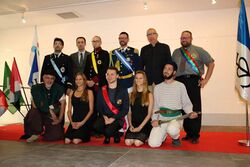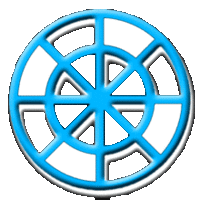Intermicronational organisation
An micronational organisation[a]—colloquially micro org(s)—is an organisation (self-styled international or intergovernmental organisation) composed of micronations which are known as member states. It is the micronational equivalent of the macronational intergovernmental organisation (IGO). They may be established through treaties or charters, outlining their structure, leadership, purpose and goals. Intermicronational organisations have a presiding officer—such as a chair or general-secretary—as well as a subordinate officer—like the vice-chair, deputy chair or vice-secretary—and other functional positions. The membership application process varies, but most organisations allow for direct membership applications with are then voted on by member states.
Meetings—usually called a session, quorum or assembly—are held to discuss proposals and make decisions. Intermicronational organisations serve different purposes, including global, regional, communal, economic, athletic and satirical interests. They engage in activities such as drafting treaties, hosting micronational summits and undertaking projects. However, many intermicronational organisations face challenges such as lack of interest or inactivity, leading to a short lifespan and criticisms, resulting in terms like "YAMO" and "United Micronations" (itself the most common name for an IMO) being used negatively.
Examples of intermicronational organisations include the erstwhile and historically significant League of Secessionist States, League of Micronations and Organisation of Active Micronations; and the current Antarctic Micronational Union, Grand Unified Micronational, MicroFrancophonie and Conference of Santiago.
Structure

Intermicronational organisations may be established by treaties or charters—similar to a constitution—which indicate the organisation's structure, leadership, purpose and goals. Some micronationalists may even reform or revive already defunct intermicronational organisations, usually without any jurisdiction to do so. This practice is largely frowned upon within most of the micronational community as reformed organisations may not have the same values as the original groups.
Like micronations, intermicronational organisations may have national symbols; often a logo or flag—or both—an emblem, coat of arms, national anthem and national languages. Symbols such as logos are important for branding and identifying IMOs, while an organisation's national languages are often the languages which may be used during projects or meetings.
Organisation
Intermicronational organisations are organisations composed of micronations referred to as member states. Nearly all intermicronational organisations have a presiding officer—often called the chair or general-secretary—a subordinate to the chair (often vice-chair; deputy chair; or vice-secretary) and numerous other offices for individual functions of the organisation, like ministries or secretaries. For instance, the Membership Secretariat would be in charge of membership applications to an organisation. Some intermicronational organisations also have judiciary positions which are above ministries or secretaries. The presiding officer generally presides over meetings of the organisation and makes sure that it conducts its business in an orderly fashion; the subordinate will have similar powers but may only exercise them on the command of the presiding officer or in their absence. Power structures vary by organisation, but generally the presiding officer and sometimes subordinate are elected; in other intermicronational organisations, the presiding officer may be elected but choose the subordinate.
Nearly all intermicronational organisations allow micronations to send in membership applications or join directly, while a scarce minority are invitation-only—ones which are geared towards maintaining a high degree of professionalism or elitism. In most cases, it is the member states who vote on the applications of other micronations for admission. Depending on how much power and authority the presiding officer holds, they may veto a micronation's application entirely if they so deem fit. In addition to membership, a number of IMOs allow a temporary status called observership as a precursor to full membership. This essentially allows a micronation to go through a "trial period" before being deemed worthy enough to attain full membership. Observer states lack the same rights as member states such as not being allowed to vote on motions.
Meetings

Most intermicronational organisations hold scheduled meetings—commonly called sessions, quorums or assemblies—wherein member states may make proposals (known as motions) for new laws, rules and membership applications within the IMO. Member states may then vote on these proposals by either supporting, opposing or abstaining. Either the presiding officer or subordinate officer will moderate these sessions to make sure all protocols are followed. Sessions may be documented with their contents released privately between member states or publicly intermicronationally; this is known as the "minutes" of a session. It is most convenient for IMOs to have one centralised place of meeting, usually on a software that allows for private sessions. Common examples are Discord servers, Twitter communities, Facebook groups and Zoom or Skype calls. Instant messaging software such as Telegram or WhatsApp may also be utilised. Due to the nature of micronationalism, many such meetings are largely informal and laidback, while some may be more professional and organised than others.
Purpose
Most intermicronational organisations can generally be placed within one of the following categories: global, regional, communal, economic, sports federations and satirical intermicronational organisations.
Global intermicronational organisations are generally open to micronations around the world so long as a certain criteria is met; examples of this include the erstwhile League of Secessionist States, League of Micronations and present-day Grand Unified Micronational. Regional intermicronational organisations are open only to micronations of a certain location, such as a continent, macronation or state (particularly common for the United States); examples of this are the Union of Micronations of Central Europe, Antarctic Micronational Union and formerly the Conference of Santiago—which has since become a global organisation. Communal organisations are those restricted to micronations which share a common bond, such as some cultural, linguistic, ethnic, religious, or historical link; examples are the erstwhile Christian Theocratic Union—for Christian micronations—and the present-day MicroFrancophonie for French-speaking micronations.
Economic intermicronational organisations are focused on economic policy goals—many are open to free trade between micronations, establishing a unified intermicronational currency or stock exchange, and sharing economic theories between member states. An example of this is the erstwhile Micronational Economic Group. Sports federations are dedicated to hosting online sporting events, whether dedicated to multiple sports or just one; an example of a multi-sport IMO is the Micronational Olympic Federation. Lastly, satirical intermicronational organisations are created to satirise other IMOs or ongoings within the inetrmicronational community. Additionally, two notable subcategories of global intermicronational organisations are social and developmental IMOs; social IMOs focus on socialising and diplomacy between member states whilst developmental IMOs are focused on helping micronations develop through various programs and initiatives from older and more developed micronations.
Activities

Aside from meetings and micronational diplomacy, intermicronational organisations may also do numerous other activities and have various projects. The two most common activities include intermicronational treaties and the hosting of physical summits, virtual meetings and special meeting sessions. Some treaties may be drafted to normalise community relations or to conclude conflicts. The Wrythe Convention drafted by the Grand Unified Micronational in 2018 is the most signed treaty in intermicronational history, with over 120 signatories. It condemns sockpuppeting, identity theft and false claims within micronationalism.
Summits hosted by intermicronational organisations include the 2012 LIR Union Summit by the LIR Union with four attendees and the 2019 GUM Birmingham Summit by the Grand Unified Micronational with 12 attendees. MicroFrancophonie has hosted three summits in France between its member states—the first in 2016 in Aigues-Mortes, Occitania; the second in Vincennes, Paris in 2018 with 15 attendees; and the third and so far last summit in 2022 in Blaye, Nouvelle-Aquitaine also with 15 attendees. Notable general projects by intermicronational organisations include the defunct Micronations DataBase in early 1997 by the League of Secessionist States, which was a web directory listing 574 micronations; and the OAM Influence Survey created in 2010 by the erstwhile Organisation of Active Micronations.
History

The earliest documented intermicronational organisation is the League of Secessionist States (LoSS), founded on 26 November 1980 by Robert B. Madison, king of the Kingdom of Talossa, during his childhood. It was originally an alliance between three micronations in opposition towards a fourth. But after 1983, the LoSS became inactive. The scarcity of intermicronational organisations prior to 1995 can be explained by the lack of micronations within close proximity to one another. However, by 1995, the micronational Internet boom allowed for easy communication between Internet users around the world. Free web hosting services such as GeoCities, Angelfire and Tripod.com wmade it easy for micronationalists to create their own intermicronational organisations online.
The LoSS may have been the first, reestablished in April 1996 by Madison. It operated via e-mail until moving to a Usenet newsgroup on 16 September. Becoming highly regarded in the micronational community, the first incarnation of the United Micronations—in emulation of the macronational United Nations (UN)—was established in March 1997 as a purely apolitical and diplomat forum. The 2012 LIR Union Summit hosted by the LIR Union in Indonesia on 10 August was the first micronational summit hosted by an IMO, and had four attendees. The growing popularity of social networking services from 2010 onwards has since made it easier to host a micronational presence online without the need of a web hosting service; intermicronational organisations are now hastily founded on services such as Skype, Facebook, Twitter, Instagram, Discord and MicroWiki, where they are operated via talk pages.
Criticism of intermicronational organisations
The majority of intermicronational organisations collapse or struggle with inactivity within a short period of time following their foundation. The most common reasons include a lack of interest, of a clear purpose or of experienced micronationalists. The commonness of short-lived intermicronational organisations has resulted in the emergence of the term YAMO—an acronym for "yet another micronational organisation"—that is used to insult or defame an organisation which is seen as serving no purpose, being underdeveloped or being short-lived. The YAMO Federation is an intemicronational organisation established at MicroCon 2019 with the stated goal to "try to find out why almost all micronational organisations fail or dissolve quickly." The name United Micronations (UM) has been given to several intermicronational organisations in emulation of the macronational United Nations (UN), beginning with the first UM founded in March 1997. The name is so common that is has also emerged as an insult or placeholder name for any intermicronational organisation. A similarly common variant is the Organisation of United Micronations.
See also
Notes
- ↑ American and Canadian English: organization.



